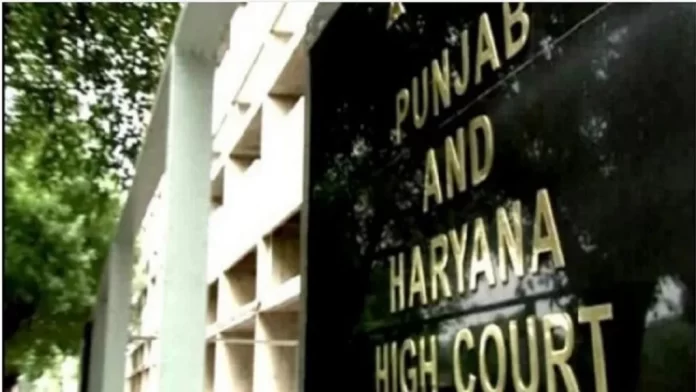The Punjab and Haryana High Court allowed a petition and set aside the order passed by the Court of the Sessions Judge, SAS Nagar (Mohali) , which restored the complaint to its original number without issuing process to the Petitioner.
The brief facts of the case are that a criminal complaint was filed against the husband-wife under Sections 420, 406, 465, 466, 467, 471 and 120-B IPC. The said complaint came to be dismissed for non-appearance of the complainant in December 2021. The respondent/complainant filed a revision petition against the order . VOn February 2022, the Sessions Judge, SAS Nagar (Mohali) without issuing process to the petitioner-accused set aside the order of 2021 and restored the complaint to its original number and remanded the case back to the Trial Court to proceed in accordance with law.
The counsel for the petitioner-accused contended that the impugned order was liable to be set aside in view of the provisions of Section 401 Cr.P.C. Reliance is placed on the judgment of the Supreme Court in ‘Manharibhai Muljibhai Kakadia and another versus Shaileshbhai Mohanbhai Patel and others, 2012(4) RCR (Criminal) 689’.
The counsel for the respondent-complainant, on the other hand, contended that as the complaint case was dismissed-in-default at the pre-summoning stage, there was no need to issue process to the prospective-accused, and therefore, the impugned order had rightly been passed and the present petition was liable to be dismissed.
Before proceedings further ,Justice Jasjit Singh Bedi examined the provisions of Section 401 Cr.P.C. –
“401. High Court’ s Powers of revisions:-
(1) In the case of any proceeding the record of which has been called for by itself or Which otherwise comes to its knowledge, the High Court may, in its discretion, exercise any of the powers conferred on a Court of Appeal by sections 386, 389, 390 and 391 or on a Court of Session by section 307 and, when the Judges composing the Court of revision are equally divided in opinion, the case shall be disposed of in the manner provided by section 392.
(2) No order under this section shall be made to the prejudice of the accused or other person unless he has had an opportunity of being heard either personally or by pleader in his own defence.
(3) Nothing in this section shall be deemed to authorise a High Court to convert a finding of acquittal into one of conviction.
(4) Where under this Code an appeal lies and no appeal is brought, no proceeding by way of revision shall be entertained at the instance of the party who could have appealed.
(5) Where under this Code tan appeal lies but an application for revision has been made to the High Court by any person and the High Court Is satisfied that such application was made under the erroneous belief that no appeal lies thereto and that it is necessary in the interests of justice so to do, the High Court may treat the application for revision as a petition of appeal and deal with the same accordingly”.
The Supreme Court in the case of ‘Manharibhai Muljibhai Kakadia and another versus Shaileshbhai Mohanbhai Patel and others, 2012(4) RCR (Criminal) 689’, has held as under:-
“58. We are in complete agreement with the view expressed by this Court in P. Sundarrajan, Raghu Raj Singh Rousha and A.N. Santhanam. We hold, as it must be, that in a revision petition preferred by complainant before the High Court or the Sessions Judge challenging an order of the Magistrate dismissing the complaint under Section 203 of the Code at the stage under Section 200 or after following the process contemplated under Section 202 of the Code, the accused or a person who is suspected to have committed crime is entitled to hearing by the revisional court. In other words, where complaint has been dismissed by the Magistrate under Section 203 of the Code, upon challenge to the legality of the said order being laid by the complainant in a revision petition before the High Court or the Sessions Judge, the persons who are arraigned as accused in the complaint have a right to be heard in such revision petition. This is a plain requirement of Section 401(2) of the Code. If the revisional court overturns the order of the Magistrate dismissing the complaint and the complaint is restored to the file of the Magistrate and it is sent back for fresh consideration, the persons who are alleged in the complaint to have committed crime have, however, no right to participate in the proceedings nor they are entitled to any hearing of any sort whatsoever by the Magistrate until the consideration of the matter by the Magistrate for issuance of process. We answer the question accordingly. The judgments of the High Courts to the contrary are overruled”.
On perusal of Section 401 Cr.P.C. as discussed by the Supreme Court in Manharibhai Muljibhai Kakadia and another (supra), the Bench noted that where a complaint has been dismissed by the Magistrate and the said order has been challenged by the complainant in a revision petition before the High Court or the Sessions Court, the persons who are arraigned as accused in the complaint have a right to be heard in such a revision petition. In the instant case, the impugned order has been passed without hearing the petitioner-accused and therefore, is liable to be set aside , said the Court.


